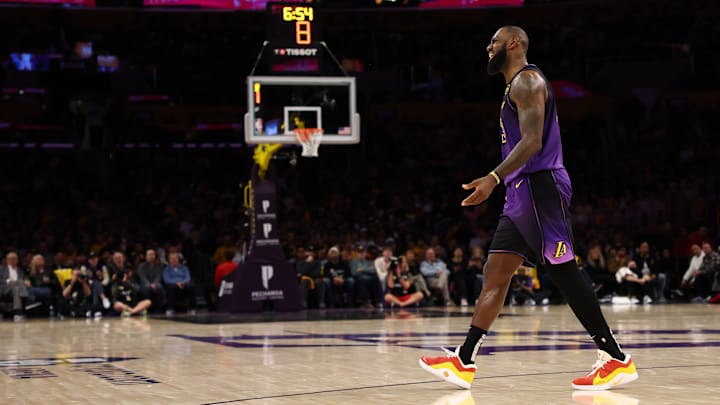In the midst of his mind-blowing 22nd season, Los Angeles Lakers superstar LeBron James is about as difficult to criticize as any player in the NBA. James is already a four-time NBA champion with a matching four regular season MVP awards, and he continues to set the standard for longevity.
For as difficult as it is to poke holes in James' approach to the game, there's an unfortunate truth taking hold in Los Angeles: The Lakers need him to play differently.
From a statistical perspective, James is putting together an age-40 season for the ages. He's averaging 23.7 points, 8.8 assists, 7.6 rebounds, and 2.2 three-point field goals made while converting at a ridiculously efficient clip of .509/.391/.762.
In his first season as a true No. 2, James has given the Lakers the type of production that many No. 1 players would struggle to provide.
Unfortunately, the inevitable struggles that arise from a transition to a new role after 21 completed seasons as a clear-cut No. 1 are beginning to limit the Lakers' potential. No example shines brighter than the apparent struggle to determine when assertiveness is the answer.
Perhaps it's all by design, with the Lakers hoping to conserve James' energy for the playoffs, but the team needs him to focus more on scoring if they're going to avoid the Play-In Tournament.
Lakers need LeBron James to focus on scoring
James' value as a facilitator is undeniable, but the importance of his scoring can't be overstated. When he asserts himself as a scorer, teams bend to accommodate his every motion, which thus opens up the floor for everyone around him.
More importantly, when James is taking it upon himself to put points on the board at a high and aggressive level, the Lakers are an infinitely better team.
Thus far in 2024-25, the Lakers are 13-6 when James puts up at least 17 field goal attempts. By comparison, Los Angeles is just 5-10 when he shoots the ball 16 times or less—a dramatic decline in winning percentage from .684 to .333.
Furthermore, the Lakers are 6-3 when James scores at least 30 points, 9-6 when he tallies 25 or more, and 9-10 when he plays but produces fewer than 25 points.
Important context is that the Lakers are also 10-4 when James has at least 10 assists and 14-9 when he has at least eight. That paints an accurate picture of the Lakers still relying heavily on the four-time Finals MVP for guidance in every phase of the offensive game.
The harsh reality in Los Angeles, however, is that they simply don't have anyone other than Davis and James who has truly established themselves as a consistent scoring threat.
Austin Reaves has taken a significant step forward, averaging 20.0 points per game over his past 13 appearances, but he's shooting just 42.6 percent from the field during that time. Thankfully, he's also producing 7.5 assists per contest during that same window.
Perhaps Reaves' continued development as the Lakers' point guard of the future is what James needed to shift into more of a high-volume scoring role in 2024-25.
That in no way suggests that Los Angeles can afford to go without James' court vision and general IQ, but Reaves offers more relief as a facilitator than as a scorer at this stage. That should encourage James to score with a more determined mentality, putting up enough shots to keep a defense honest.
If James can adapt his approach to what the team needs and focus more on scoring, the Lakers could avoid the Play-In Tournament and become the contender they've shown flashes of becoming.
